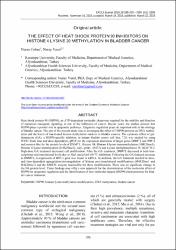| dc.contributor.author | Çoban, Nuran | |
| dc.contributor.author | Varol, Nuray | |
| dc.date.accessioned | 2021-05-05T22:14:17Z | |
| dc.date.available | 2021-05-05T22:14:17Z | |
| dc.date.issued | 2019 | |
| dc.identifier.issn | 1611-2156 | |
| dc.identifier.uri | https://doi.org/10.17179/excli2018-1807 | |
| dc.identifier.uri | https://hdl.handle.net/20.500.12933/412 | |
| dc.description | WOS:000464110700001 | en_US |
| dc.description | PubMed: 31217782 | en_US |
| dc.description.abstract | Heat shock protein 90 (HSP90), an ATP-dependent molecular chaperone required for the stability and function of numerous oncogenic signaling, is one of the hallmarks of cancer. Recent years, the studies showed that HSP90 plays a pivotal role in epigenetic pathways. Epigenetic regulation plays an important role in the etiology of bladder cancer. The aim of the present study was to investigate the effect of HSP90 proteins on DNA methylation and the levels of inactivated histone methylation markers in bladder cancers. The cytotoxic effect of geldanamycin (GA), a HSP90-specific inhibitor, in human bladder cancer cell line, T24, was studied by using WST1 (both time and dose-dependent), qPCR for the expression aberration of target genes DNMT1 and WIF-1 and western blot for the protein levels of DNMT1, Histone H4, Histone 4 lysine monomethylation (H4K20me1), Histone 4 lysine trimethylation (H4K20me3), Akt1, pAkt1 (S473) and Lysine methyltransferase 5C (KMT5C). High-dose GA treatment decreased cell proliferation. After the GA treatment, DNMT1 decreased at both transcriptional and translational levels due to Akt1 and pAkt1 (S473) inhibition. Following the GA-induced decrease in DNMT1, re-expression of WIF-1 gene was found at mRNA. In addition, the GA treatment resulted in dose- and time-dependent upregulation/downregulation of histone post-translational modifications (H4K20me1 and H4K20me3) and the KMT5C enzyme responsible for these modifications. There was no significant change in the H4 protein level. These findings may offer a new approach for the determination of the molecular effect of HSP90 on epigenetic regulation and the identification of new molecular targets (HSP90 client proteins) for bladder cancer treatment. | en_US |
| dc.description.sponsorship | Scientific Research Projects Coordination Unit of Kocatepe University [16] | en_US |
| dc.description.sponsorship | This work was supported by The Scientific Research Projects Coordination Unit of Kocatepe University, Project Number: 16. SAG. 20. | en_US |
| dc.language.iso | eng | en_US |
| dc.publisher | Excli Journal Managing Office | en_US |
| dc.rights | info:eu-repo/semantics/openAccess | en_US |
| dc.subject | HSP90 | en_US |
| dc.subject | histone lysine methylation modifications | en_US |
| dc.subject | DNA methylation | en_US |
| dc.subject | bladder cancer | en_US |
| dc.title | THE EFFECT OF HEAT SHOCK PROTEIN 90 INHIBITORS ON HISTONE 4 LYSINE 20 METHYLATION IN BLADDER CANCER | en_US |
| dc.type | article | en_US |
| dc.department | AFSÜ, Tıp Fakültesi, Dahili Tıp Bilimleri Bölümü, Tıbbi Genetik Ana Bilim Dalı | en_US |
| dc.contributor.institutionauthor | Varol, Nuray | |
| dc.identifier.doi | 10.17179/excli2018-1807 | |
| dc.identifier.volume | 18 | en_US |
| dc.identifier.startpage | 195 | en_US |
| dc.identifier.endpage | 203 | en_US |
| dc.relation.journal | Excli Journal | en_US |
| dc.relation.publicationcategory | Makale - Uluslararası Hakemli Dergi - Kurum Öğretim Elemanı | en_US |
















